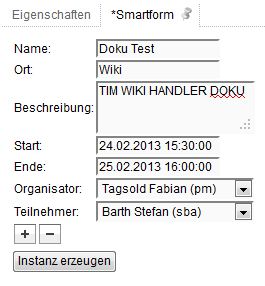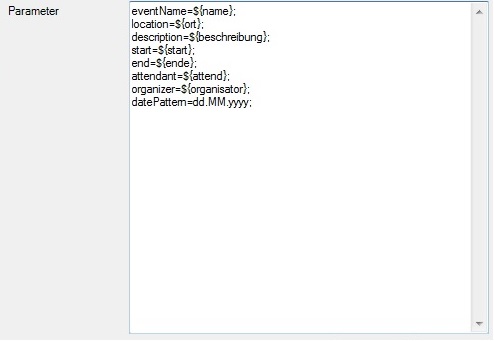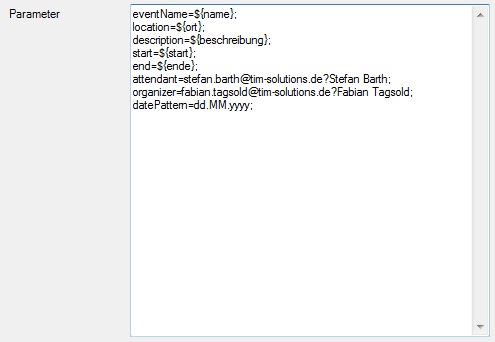This is an old revision of the document!
Table of Contents
ICalHandler
Description
This handler allows an appointment, which has been created in a smart form, to be sent to all participants.
Action Class
com.dooris.bpm.actionhandler.ICalHandler
Event Type
any
Action Name
any
Mandatory Fields
none
Parameter
eventName
Name of the meeting. May be derived from process variables –> $(processvariable)
(see example).
description
Description of the meeting. May be derived from process variables –> $(processvariable)
(see example).
location
Location of the meeting. May be derived from process variables –> $(processvariable)
(see example).
start
Start of the meeting.
i.e. in the format: dd.MM.yyyy HH:mm:ss ⇒ 13.02.2013 17:00:00 (see Pattern)
May be derived from process variables –> $(processvariable)
(see example).
end
End of the meeting.
i.e. in the format: dd.MM.yyyy HH:mm:ss ⇒ 13.02.2013 19:00:00 (see Pattern)
May be derived from process variables –> $(processvariable)
(see example).
organizer
Organizer of the meeting.
May be derived from process variables –> $(processvariable)
If the organizer is derived from a process variable:
${organizer}
Process variable: organizerEmail –> Email Address
Process variable: organizerRealName –> Name displayed in the meeting request.
If the organizer is given directly to the handler:
Format: email?name
(Usage of “selectUsersByGroupByClass” is possible!).
(see example).
attendant
Participants of the meeting.
May be derived from a process variable –> $(processvariable)
If the participant is derived from a process variable:
${attendant}
attendant[0]Email
attendant[0]RealName
attendant[1]Email
attendant[1]RealName
Or: ${attendant} → E-mail addresses are separated by commas!
If the participant is given directly to the handler:
Format: E-mail addresses are separated by commas!
(Usage of “selectUsersByGroupByClass” is possible!).
(see example).
datePattern
The pattern depicting how the date variables are formatted.
z.B.: dd.MM.yyyy
fullTime
Controls if the last day of the entry should be counted as an all-day event. This is set to false by default.
Example: fullTime = true;




